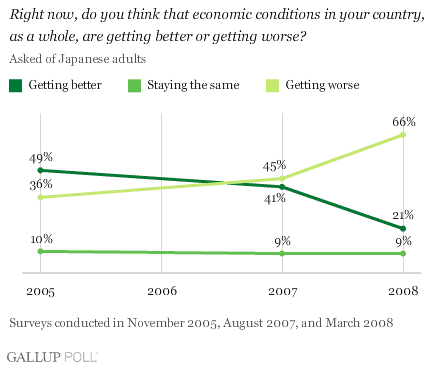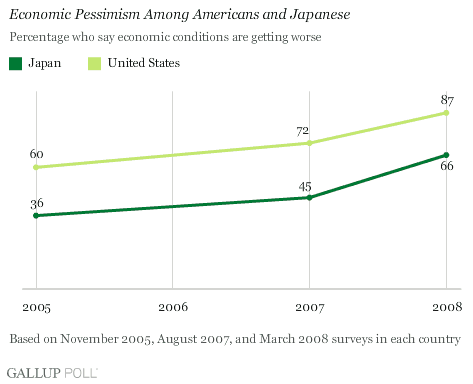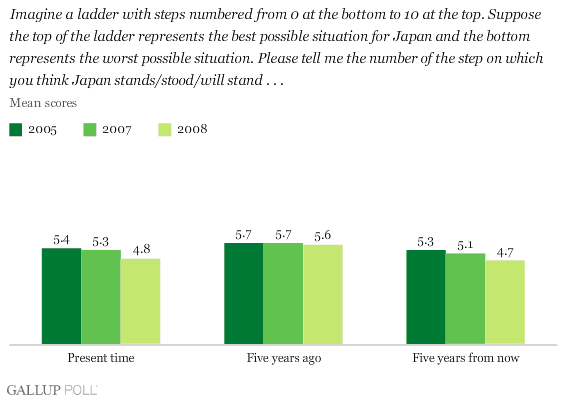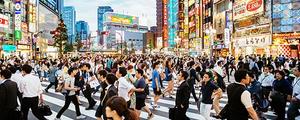WASHINGTON, D.C. -- As G8 leaders meet in Japan this week to grapple with global concerns, including rising food and oil prices, Japanese consumers are offering their bleakest outlook to date on the direction of their economy and their nation. With a potential economic slowdown on their country's horizon, Gallup Polls show Japanese consumer pessimism increased sharply from 45% in August 2007 to 66% in March 2008.

Three years ago, Japanese consumers were riding the tide of strong economic growth and were more likely to see economic conditions as getting better than getting worse. But as global economic conditions slumped in 2007 and fuel and food prices rose, Gallup data show Japanese confidence started to falter and has only weakened since. When Japan's household spending began its three-month skid in March, two in three residents told Gallup that they thought economic conditions were getting worse.
It would appear that, at least in the short term, the pessimism Japanese expressed in March was warranted. In May, cost-pushed inflation reached a decade high, wages grew at their slowest pace in five months, and the number of jobs available hit a three-year low, all of which likely further damaged consumer sentiment. Economists are anticipating that the country's economy will continue to slow or possibly contract in coming months.
Pessimistic Japanese, Dismal Americans
Concerns about a global economic downturn and a U.S. slowdown are likely fueling Japanese consumers' fears and pessimism about their own economy, but for perspective, they remain far less pessimistic than their U.S. counterparts. It's important to note, however, that the gap between the percentage of Americans saying U.S. economic conditions are getting worse and the percentage of Japanese saying their economy is getting worse has narrowed somewhat, and their opinions appear to follow a similar trajectory.

Japan's Past, Present, and Future
Gallup's surveys show Japanese have also grown more pessimistic about their country's current and future standing overall, which could be troubling should the country enter an extended slowdown.

The decline in Japanese consumers' assessments of the state and direction of their nation may be tied to concerns about rising prices and inflation and the effects on their pocketbooks. In 2005 and 2007, more than 7 in 10 Japanese consumers said they were satisfied with their standard of living, but this dropped to slightly more than 6 in 10 in March of this year.
Bottom Line
Gallup Polls in Japan suggest the specter of a global economic downturn and rising prices appear to have shaken consumer confidence in one of the world's largest economies. If Japanese consumers continue to hurt, their pain could be felt throughout Asia -- where countries are already buckling under inflation -- and could ripple throughout the world.
Survey Methods
Results are based on telephone interviews with approximately 1,000 adults living in Japan, aged 15 and older, conducted in November 2005 and August 2007, and 750 adults in March 2008. For results based on the total samples of adults, one can say with 95% confidence that the maximum margin of sampling error is ±4 percentage points for a sample of 750 and ±3 percentage points for samples of 1,000. In addition to sampling error, question wording and practical difficulties in conducting surveys can introduce error or bias into the findings of public opinion polls.